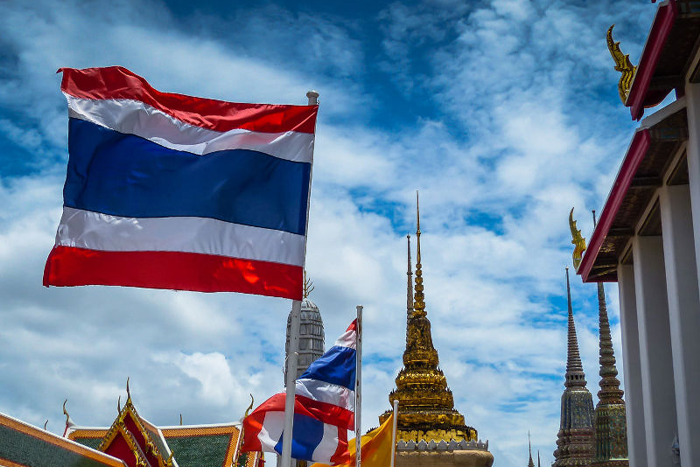Chairman’s Note
Private and Confidential
For SIIA Corporate Members and Advisors
March 2023
I was in Bangkok on 19-21 February and met with a number of current and former political leaders as well as experts. Thailand is a major economy and manufacturing hub and elections are gearing up rapidly. I thought therefore to share some of the points from the trip that I found interesting and add to the analysis available in the media.
Please note that the points in this “field note” are not fully researched by the SIIA. They do not intend to give a complete evaluation. Nor do they necessarily represent my own preferences. I hope nevertheless they might be of interest as current perspectives, gleaned from my short visit.
- Conflict and Street Protests: While tensions are rising, there is general confidence that violent conflict and prolonged street protests will not recur in the run-up to the elections. The Opposition Peau Thai feel positive on their chances for strong electoral support. The incumbent government has to show its ability to ensure stability. This assurance amongst Thais is in contrast to fears expressed by some foreign media and experts. There is however potential for post-election confrontation.
- Election Predictions: The bet is that the Peau Thai party will do the best in the upcoming elections. Long associated with Thaksin Shinawatra, the announced candidature of his daughter, Paetongtarn, has galvanized party supporters. Polls suggest she has 34% support, more than double that of the incumbent PM. Experts believe they can win around 200-220 seats to be the largest party in 500-seat Parliament. Some even predict that an absolute majority is possible.
- Post-Election Compromise? Even with a big win, the Peau Thai will have to contend with the Senate. These are nominated establishment figures and, in the current Thai system, their votes also count towards the choice of PM. As such, if incumbent PM Prayut wins Senate support plus his party – now the United Thai Nation – secures a reasonable number, it is possible that he can continue in office. Another scenario would be to back current DPM Prawit Wongsuwon who will lead the Palang Pracharat Party (the current government party).
- Post Election Push? If the Peau Thai win an absolute majority, they will likely form the government. There will be resistance among the Thai establishment to Ms Paetongtarn being PM and even stronger resistance to any move to allow Khun Thaksin back into the country and into politics. If there is no compromise, there may be intervention by a legal body or in Parliament.
- Establishment Control and Longevity: Voting rules, Constitutional rules and legal processes have been used to keep Thaksin and his allies out of power. Some believe such methods may again be resorted to as a last resort. Yet the elections commission is showing a measure of independence, as shown in its decision to limit Prayut’s tenure. The current constitutional arrangements favor the establishment but there are limits. First, the Senate’s term will not last for the full term of the lower house and the government would become effectively a minority with difficulties in governing. Second, the Constitutional court has ruled that the current PM Prayut’s term is limited and cannot extend beyond 2025. There is also an element of restlessness even among some Thai elites to the incumbents given their tenure is already long, by Thai standards.
- Smaller Parties: Much higher thresholds will be put in place before a party is entitled to a seat in the House through the party list. This means that the smallest parties with just a handful of seats may be displaced. However, the mid-sized parties like the Bhumjaithai and Democrat parties can do well and be swing players if margins for Peau Thai are narrower.
- Move Forward and Youth: There is a restive voice among young Thais. The Move Forward Party already holds some 50 seats and is likely to garner good support again. However, their attack on Article 112 (the lese majesty provision that prohibits criticism of the Royalty) is anathema to the establishment. While they are currently allied with the Peau Thai, this could be a dividing line between the two parties as the Peau Thai wishes to be acceptable to the Palace.
- Preference for Stability: The economy and business sentiment in Thailand remains in recovery. Tourist numbers remain considerably below pre-pandemic levels and global conditions also impact exports. Only modest growth is expected. Given this, no one wants to see political turmoil especially prolonged protests in the streets, let alone violent conflict. The preference of the establishment (and some believe the Palace) is to show stability and unity
The many different sides and factions are hotly contesting for power and there is much at stake. The contestation is however with an awareness of the risks of unrest. The coming weeks will see not only campaigning for votes, but also likely back-room negotiations to consider ways to find a post-election compromise.
Considerable elements will not be in the open and media reports may be slanted. The situation will be fast moving and bears attention. I hope these “field notes” while far from complete might be of interest to you. As I do meet with figures in different camps, I would be grateful if you keep this in confidence.
Sincerely,

Simon Tay
Chairman
![[Premium] Chairman’s Field Note: Thailand](https://siiaonline.org/wp-content/uploads/2023/03/thailand-travel-guide-top-banner-mobile.png)



